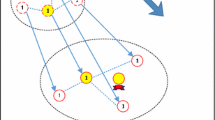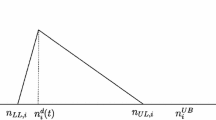Abstract
This paper studies a dynamic recruitment problem with enterprise performance in the uncertain environment, in which a firm first interviews finite job applicants sequentially and then makes an employment decision according to results of the interview. Since the assessment of the firm about each interviewee’s capability is subjective and the interviewees are heterogeneous, it is reasonable to characterize these assessments as independent but not identically distributed uncertain variables. What’s more, an uncertain sequential search model is established to maximize the benefit of the recruitment firm. Moreover, an optimal search strategy is presented by adopting the principle of optimality and the reservation value rule. The results demonstrate that the threshold of recruitment decreases with the search cost, and increases with the enterprise performance level. In addition, we find that the low employment risk applicant will be preferred. Finally, some numerical examples are given to illustrate the effectiveness of the proposed model.



Similar content being viewed by others
References
Bellman, R. E. (1957). Dynamic programming. New Jersey: Princeton University Press.
Cheng, C., & Prabhu, V. (2013). An approach for research and training in enterprise information system with RFID technology. Journal of Intelligent Manufacturing, 24(3), 527–540.
Chang, Q., Ni, J., Bandyopadhyay, P., Biller, S., & **ao, G. (2007). Maintenance staffing management. Journal of Intelligent Manufacturing, 18(3), 351–360.
Chen, X., Liu, Y., & Ralescu, D. A. (2013). Uncertain stock model with periodic dividends. Fuzzy Optimization and Decision Making, 12(1), 111–123.
DeGroot, M. H. (2004). Optimal statistical decisions. New Jersey: Wiley.
DeVaro, J. (2005). Employer recruitment strategies and the labor market outcomes of new hires. Economic Inquiry, 43(2), 263–282.
DeVaro, J. (2008). The labor market effects of employer recruitment choice. European Economic Review, 52(2), 283–314.
Eriksson, S., & Gottfries, N. (2005). Ranking of job applicants, on-the-job search, and persistent unemployment. Labour Economics, 12(3), 407–428.
Galenianos, M., & Kircher, P. (2009). Directed search with multiple job applications. Journal of Economic Theory, 144(2), 445–471.
Gao, Z., & Guo, H. (2013). Some properties of uncertain dominance. International Information Institute (Tokyo). Information, 15(12), 168–173.
Gorter, C., & Van Ommeren, J. (1999). Sequencing, timing and filling rates of recruitment channels. Applied Economics, 31(10), 1149–1160.
Granovetter, M. (1995). Getting a job. Cambridge: Harvard Press.
Huang, Y., Chu, F., Chu, C., & Wang, Y. (2012). Determining the number of new employees with learning, forgetting and variable wage with a Newsvendor model in pull systems. Journal of Intelligent Manufacturing, 23(1), 73–89.
Kang, B. K. (1999). Optimal stop** problem with recall cost. European Journal of Operational Research, 117(2), 222–238.
Kang, B. K. (2005). Optimal stop** problem with double reservation value property. European Journal of Operational Research, 165(3), 765–785.
Lippman, S. A., & McCall, J. J. (1976). The economics of job search: A survey. Economic Inquiry, 14(2), 155–189.
Liu, B. (2007). Uncertainty theory (2nd ed.). Berlin: Springer.
Liu, B. (2008). Fuzzy process, hybrid process and uncertain process. Journal of Uncertain Systems, 2(1), 3–16.
Liu, B. (2009a). Some research problems in uncertainty theory. Journal of Uncertain Systems, 3(1), 3–10.
Liu, B. (2009b). Theory and practice of uncertain programming (2nd ed.). Berlin: Springer.
Liu, B. (2010a). Uncertain risk analysis and uncertain reliability analysis. Journal of Uncertain Systems, 4(3), 163–170.
Liu, B. (2010b). Uncertainty theory: A branch of mathematics for modeling human uncertainty. Berlin: Springer.
Liu, B. (2013a). Polyrectangular theorem and independence of uncertain vectors. Journal of Uncertainty Analysis and Applications, 1, 9.
Liu, B. (2013b). Toward uncertain finance theory. Journal of Uncertainty Analysis and Applications, 1, 1.
Liu, B. (2014). Uncertain random graph and uncertain random network. Journal of Uncertain Systems, 8(1), 3–12.
Liu, Y., & Ha, M. (2010). Expected value of function of uncertain variables. Journal of Uncertain Systems, 4(3), 181–186.
McCall, J. J. (1965). The economics of information and optimal stop** rules. Journal of Business, 38(3), 300–317.
McCall, J. J. (1970). Economics of information and job search. The Quarterly Journal of Economics, 84(1), 113–126.
Mu, R., Lan, Y., & Tang, W. (2013). An uncertain contract model for rural migrant workers employment problems. Fuzzy Optimization and Decision Making, 12(1), 29–39.
Peng, Z., & Iwamura, K. (2010). A sufficient and necessary condition of uncertainty distribution. Journal of Interdisciplinary Mathematics, 13(3), 277–285.
Saito, T. (1998). Optimal stop** problem with controlled recall. Probability in the Engineering and Informational Sciences, 12(1), 91–108.
Saito, T. (1999). Optimal stop** problem with finite-period reservation. European Journal of Operational Research, 118(3), 605–619.
Sheng, Y., & Yao, K. (2014). Some formulas of variance of uncertain random variable. Journal of Uncertainty Analysis and Applications, 2, 12.
Stevens, M. (2004). Wage-tenure contracts in a frictional labour market: Firms’ strategies for recruitment and retention. The Review of Economic Studies, 71(2), 535–551.
Stigler, G. J. (1961). The economics of information. The Journal of Political Economy, 69(3), 213–225.
Stigler, G. J. (1962). Information in the labor market. The Journal of Political Economy, 70(5), 94–105.
Wang, C., Tang, W., & Zhao, R. (2013). The infinite time horizon dynamic pricing problem with multi-unit demand. Optimization Letters, 7(6), 1125–1138.
Weitzman, M. L. (1979). Optimal search for the best alternative. Econometrica: Journal of the Econometric Society, 47(3), 641–654.
Yang, X., & Gao, J. (2013). Uncertain differential games with application to capitalism. Journal of Uncertainty Analysis and Applications, 1, 17.
Yang, X., & Gao, J. (2014). Uncertain core for coalitional game with uncertain payoffs. Journal of Uncertain Systems, 8(1), 13–21.
Yang, L., Liu, P., Li, S., Gao, Y., & Ralescu, D. A. (2015). Reduction methods of type-2 uncertain variables and their applications to solid transportation problem. Information Sciences, 291(10), 204–237.
Yao, K., & Li, X. (2012). Uncertain alternating renewal process and its application. IEEE Transactions on Fuzzy Systems, 20(6), 1154–1160.
Acknowledgments
This work is supported by the National Natural Science Foundation of China (No. 71071106), the National Natural Science Foundation of China (No. 71371133), supported partially by Specialized Research Fund for the Doctoral Program of Higher Education of China (No. 20120032110071), and supported partially by Program for New Century Excellent Talents in Universities of China.
Author information
Authors and Affiliations
Corresponding author
Rights and permissions
About this article
Cite this article
Zhou, C., Tang, W. & Zhao, R. An uncertain search model for recruitment problem with enterprise performance. J Intell Manuf 28, 695–704 (2017). https://doi.org/10.1007/s10845-014-0997-1
Received:
Accepted:
Published:
Issue Date:
DOI: https://doi.org/10.1007/s10845-014-0997-1




